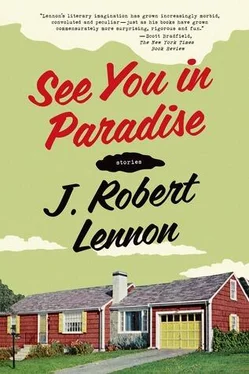“The agency?”
“The adoption agency.”
Something is welling up inside Edward, something acid and explosive, first in his churning stomach, then in his esophagus, then in his throat. How dare this man judge me, he thinks — but then again, that’s what judges do. They make judgments! And then it’s out of him and all over the room: hot laughter, cracking the air. Judgments! He falls against the counter, tears pouring from his eyes. Harlan has taken a step back. He’s put on his workaday face, the one he must wear as he pretends to listen carefully to all the evidence. Edward is gasping for breath.
“What the hell?” Harlan says.
Edward pounds the counter, hurting his hand. It feels great! He can’t seem to speak, but what would he say? The picnic, the Breeces, this house, it’s all so fucking funny! Maybe he and Alison should give up on the sex and do this at night instead, get drunk and tell jokes.
But Harlan doesn’t seem to get it, and he doesn’t seem to like not getting it. He sets himself in a bearish crouch, and his lip curls under, and the fuzzy panhandle rears back. Yikes!
Edward finds himself on the floor, his legs splayed on the terra-cotta quarry tile, his back against the cabinets. Hey, how’d he get down here? The cabinets are light blue, with red lizards stenciled on them. The whole right side of his face seems to be throbbing, yet giggles are still coming out of him, like hiccups, involuntary and annoying. Harlan has cured Edward’s indecision. There will be no adoption.
“You son of a bitch,” Edward hears. And then he is yanked to his feet and flung through the kitchen door.
“You can find your own coat, asshole,” shouts the judge.

Alison’s feet are silent in the carpeted hallway. It’s different up here, the walls are bare. When she shows a house, the upstairs hallways are always like this: hollow-core doors, shag carpeting, a life-swallowing softness. This is where she always loses the buyer, right here, as her enthusiasm leaves her.
If only enthusiasm meant anything to the State of New York. If only the sprawl and scatter of lived life was worth anything: then their house, their home, would be all the application they needed. But it was all too easy to see it through the eyes of the agency. The basement full of nail-riddled scrap lumber. The tangle of extension cords behind the sofa. The champagne stain on the living-room ceiling. All of it screaming unfit.
But this! Alison cannot compete with this. A blameless, immaculate hallway, erased of all evidence. As if in cahoots with her heart, her bladder grows heavier.
The second door on the left. There it is, the only one open. A dim light shines from inside. She can hear voices in the kitchen, Harlan’s and Edward’s, exchanging confidences. It’s so easy for men, she thinks, so hard for women. Men of any class have football and fishing to discuss; women have nothing. Or worse, they have children. Or worse still, no children.
She enters the bathroom and sees a bed. Obviously she’s made a mistake. She peeks out into the hall: second door on the left. No, it was no mistake. She’s exactly where Linda wants her. The bedroom walls are painted bright blue and red, and there is a small desk with a colorful computer on it, and there is a boom box and shelves stacked with comic books. The wallpaper is patterned with cartoon characters. There’s a Buffalo Bills throw rug.
Instinct tells her to leave immediately, to grab Edward’s arm and yank him out of the house. But she still has to pee. She spins and walks stiffly into the hall. She tries each door until she finds the real bathroom, a dimly lit fun house of globe lights and gilt mirrors.
Then she happens to glance down the stairs and sees the back of Linda’s head, the tight, ugly coif, and she changes her mind.
She goes back into the boy’s room. There is a Knicks trash can in the corner by the desk. She pulls it out a little and looks down into it, at the pale, blurred oval at the bottom, her face.
Can she do it? That is, physically? There is only one way to find out. It was hot enough today for her not to have worn panty hose, and that makes it easier.
Crouched over the can, she is amazed at the loudness of it, like rain on a corrugated tin roof.

He’s drunk, she drives. They aren’t fighting; that will happen later. What they’re doing now is thinking. Alison is thinking, To hell with adoption. Give me the drugs. If I get pregnant with eight babies, they can kill six. It’s worth it to me. I will populate the world with bold, honest, sloppy people like myself. And if Edward can’t deliver, I will use another man’s sperm, from a lab. She is amazed that she can remember the doctor’s phone number: if she had to, she could pull over at a convenience store and leave a message with the answering service. She feels fecund and powerful and reckless and correct in everything. Every thought is gilded, and sharp as a dagger.
Meanwhile, Edward is having a fantasy. He and Alison have gone back to college. They live in a dorm, with roommates who never go out: for Edward, a brooding bicyclist who always leaves sweaty towels lying around; for Alison, an angry feminist with tangled hair. How hard it is to be together, and how sweet. They meet in dark and lonely places for whispers and for sex: an abandoned carrel in the engineering library, the woods behind the physical plant, a supply closet in the business school. They talk about what it will be like someday when they’re married and have a house of their own: a place all to themselves, where they’ll never be bothered by other people. They’ll make love in every room. They’ll confess their deepest secrets, or better yet, they won’t have any.
Edward is asleep when they get home. Poor Edward, lolling half-conscious in the passenger seat, reminds Alison of a mannequin. No, a dummy: a marriage-test dummy, with a heart-shaped target on his chest where he keeps getting pounded. She unbuckles his seat belt and shakes him, but he refuses to wake. All he will do is quietly moan. So she leaves him there, in the car. Later on, showered, cold-creamed, nightgowned, she’ll lie in their bed not sleeping, her fingers on her belly, waiting for the sound of the door.
Brant Call was a pretty nice guy. He lived in a small rented house on a quiet street in the town where he went to college. He always shoveled his walk when it snowed and he always said hi to passing neighbors, and though he was young (he’d graduated only a couple years before) he acted like he was thirty-seven, and everybody liked him for it.
And Brant liked that everybody liked him. When somebody told him how much they liked one or another of his good qualities, he reacted by striving to enhance that quality, so as to become nicer still. Nobody ever pointed out his bad qualities — which included gullibility, impatience, and a creeping smugness — because they thought it might upset him, and in this they were right. In Brant’s world, people did not point out others’ bad qualities. He grew up in the suburbs, hauled old ladies’ trash cans to the curb, and was named after a beach in New Jersey. He was not introspective. It didn’t occur to him that being universally liked might be a bad thing, or even illusory.
He still worked at the college he’d attended, as managing editor of the alumni magazine of the business school. The year Brant started working there, the magazine had been rated one of the top five business school alumni magazines in America, and he took pride in this honor, though he didn’t have much to do with it. He referred to the magazine as “we,” as in, “We gotta up our donations this year,” and occasionally when he did this the person he was speaking to became confused and had to ask whom he meant by “we.” He said this very thing once to a woman about whom the magazine was running an article, and the woman tilted her head, smiled microscopically, tucked a blond lock behind a pink ear, and said, “We you, or we who do you mean?”
Читать дальше













